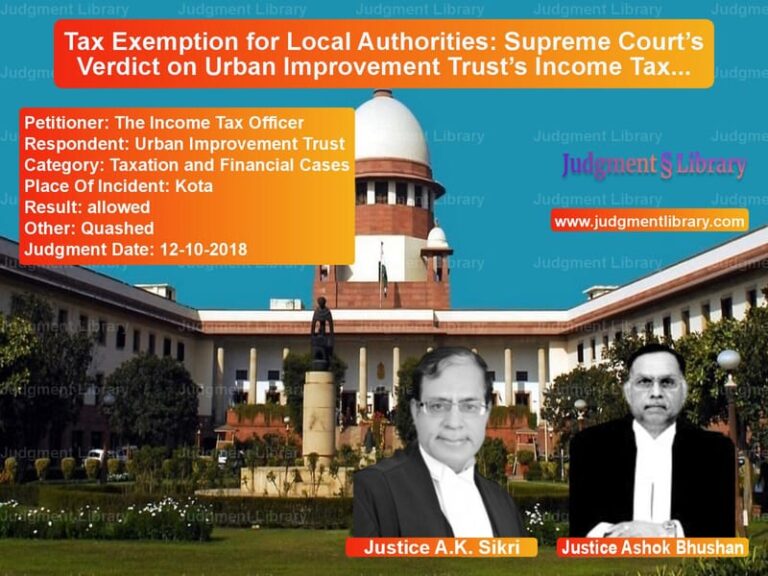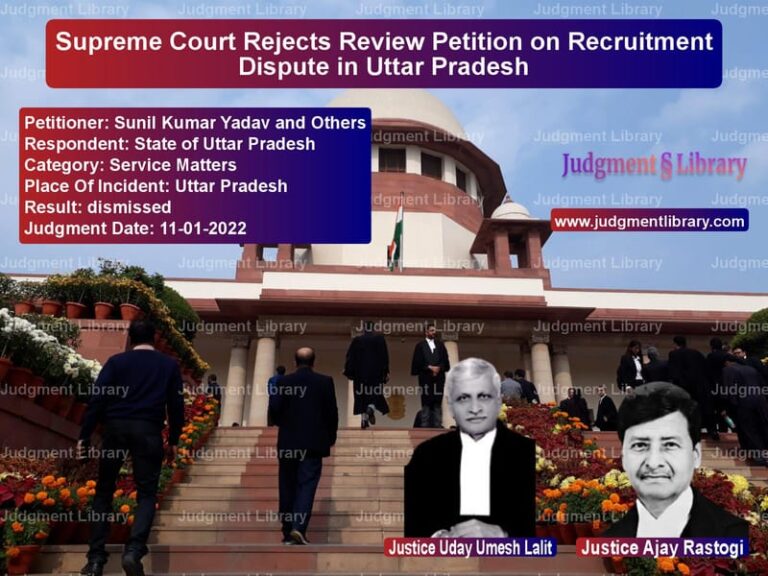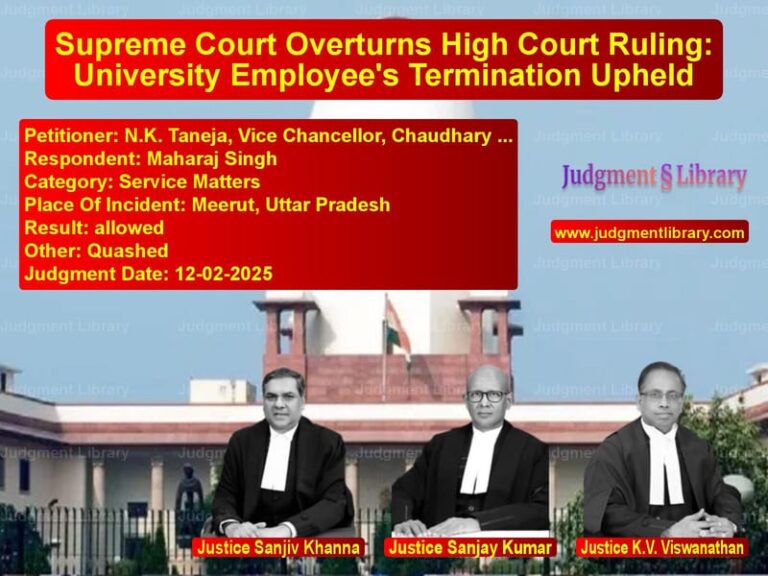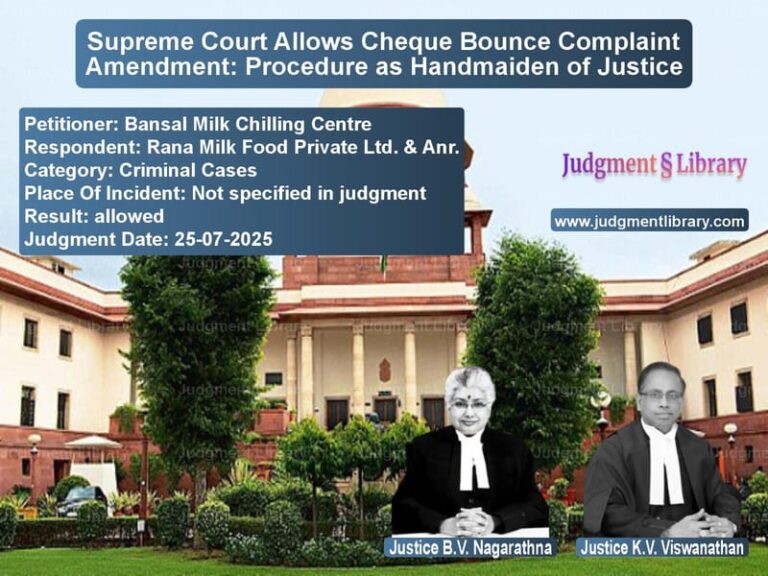Supreme Court Orders NCTE to Grant Recognition to Teacher Training Colleges
The case of Devendra Pathak Sarvodaya College of Education vs. National Council for Teacher Education & Ors. is a significant ruling concerning the recognition of teacher training colleges under the National Council for Teacher Education Act, 1993. The Supreme Court had to decide whether the National Council for Teacher Education (NCTE) was justified in granting recognition to educational institutions only from the academic year 2022-2023, despite their compliance with all requirements in time for the 2021-2022 session.
Multiple writ petitions were filed by various educational institutions challenging the decision of the NCTE and its Regional Committees to defer their recognition to the following academic session. The Supreme Court ruled in favor of the petitioners, allowing them to admit students for the academic year 2021-2022.
Background of the Case
The dispute arose when several teacher training institutions sought recognition from the NCTE to conduct Bachelor of Education (B.Ed.) and Diploma in Elementary Education (D.El.Ed.) courses. Key facts of the case include:
- The petitioners applied for recognition to conduct B.Ed. and D.El.Ed. courses from the academic session 2021-2022.
- The NCTE granted recognition but deferred it to the academic year 2022-2023.
- The institutions had already fulfilled all infrastructural and instructional requirements mandated by the National Council for Teacher Education (Recognition, Norms, and Procedure) Regulations, 2014.
- The petitioners approached the Supreme Court, arguing that the delay was unjustified and would cause irreparable financial loss.
Petitioner’s Arguments
The educational institutions argued that:
- They had fully complied with all NCTE norms and received a positive inspection report.
- The delay in granting recognition was solely due to administrative inefficiency of the NCTE.
- Since the admission process had not yet started, students could still be admitted for the 2021-2022 session.
- The decision to grant recognition from 2022-2023 lacked a rational basis and was in violation of their fundamental rights under Article 19(1)(g) of the Constitution of India.
- Previous judgments had extended deadlines for admissions in similar situations, and the same approach should be adopted here.
Respondent’s Arguments
The NCTE and State Governments argued that:
- The Supreme Court, in the Maa Vaishno Devi Mahila Mahavidyalaya case, had laid down specific timelines for granting recognition and conducting admissions.
- Any deviation from the schedule could create academic disarray and affect student admissions.
- The petitioners should have approached the authorities earlier to ensure timely recognition.
Key Legal Issues
The Supreme Court examined the following legal issues:
- Whether the NCTE’s decision to defer recognition to the 2022-2023 session was legally justified.
- Whether the delay was attributable to the petitioners or the NCTE.
- Whether extending the admission deadline would disrupt the academic calendar.
- Whether the petitioners were entitled to relief under constitutional and administrative law principles.
Court’s Observations
The Supreme Court made several important observations:
1. Delay Was Attributable to NCTE
The Court noted that the delay in granting recognition was not due to any fault of the petitioners. It stated:
“In the absence of any deficiency in infrastructure and compliance, NCTE had no valid reason to deny recognition for the academic year 2021-2022.”
2. Recognition Had Already Been Granted
The Court highlighted that the petitioners had already been found eligible for recognition, and therefore, delaying the implementation was irrational and arbitrary.
3. Admissions Had Not Yet Begun
The Court found that since counseling and admissions had not yet commenced, there was no disruption in granting recognition for 2021-2022.
4. Precedents Supported the Petitioners
The Court referred to previous cases where deadlines had been extended in exceptional circumstances. It noted:
“The time-frame prescribed in Maa Vaishno Devi Mahila Mahavidyalaya has been modified in previous cases, and a similar approach must be followed here.”
Final Verdict
The Supreme Court allowed the petitions and ruled:
- The NCTE must grant recognition to the petitioners for the academic session 2021-2022.
- The cut-off date for admissions was extended to accommodate new students.
- The petitioners’ names must be included in the counseling and admission process immediately.
- The NCTE and its Regional Committees must issue formal notifications within three days.
The Court concluded:
“Once an institution meets the required standards, bureaucratic delays cannot be allowed to deprive them of their rightful recognition.”
Implications of the Judgment
This ruling has significant implications for teacher education in India:
- Strengthening Accountability: Government bodies cannot arbitrarily delay approvals for educational institutions.
- Protecting Institutions’ Rights: Educational institutions can challenge administrative inefficiencies that impact their operations.
- Ensuring Timely Admissions: The ruling prevents unnecessary delays that could deprive students of academic opportunities.
- Judicial Review in Regulatory Matters: The case establishes that courts can intervene in regulatory decisions if they are arbitrary.
Overall, the ruling ensures fairness in the recognition process and reaffirms that institutions that comply with regulatory norms cannot be unfairly deprived of their rights.
Petitioner Name: Devendra Pathak Sarvodaya College of Education.Respondent Name: National Council for Teacher Education & Ors..Judgment By: Justice R.F. Nariman, Justice B.R. Gavai.Place Of Incident: India.Judgment Date: 11-08-2021.
Don’t miss out on the full details! Download the complete judgment in PDF format below and gain valuable insights instantly!
Download Judgment: devendra-pathak-sarv-vs-national-council-for-supreme-court-of-india-judgment-dated-11-08-2021.pdf
Directly Download Judgment: Directly download this Judgment
See all petitions in Education Related Cases
See all petitions in Contract Disputes
See all petitions in Specific Performance
See all petitions in Public Interest Litigation
See all petitions in Consumer Rights
See all petitions in Judgment by Rohinton Fali Nariman
See all petitions in Judgment by B R Gavai
See all petitions in allowed
See all petitions in supreme court of India judgments August 2021
See all petitions in 2021 judgments
See all posts in Civil Cases Category
See all allowed petitions in Civil Cases Category
See all Dismissed petitions in Civil Cases Category
See all partially allowed petitions in Civil Cases Category







